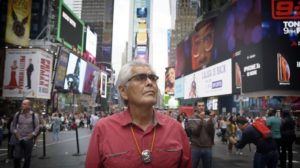The Victoria Film Festival’s program guide can be daunting, featuring everything from movies that are deeply meaningful and will really stay with the viewer long after the end credits roll to movies that are more on the lighter side of things.
If you’re more into the former, Charles Wilkinson’s Haida Modern: The Art and Activism of Robert Davidson is one movie to check out this year. The film tells Davidson’s story and explores the resurgence of North Coast culture. Wilkinson—who lives near Vancouver—says that although he has worked on films about Haida Gwaii in the past, it wasn’t until recently that he actually got to visit there. He says it has a “mystical aura” about it, and that “you just step off the plane and you feel something different.”
“The story of Haida Gwaii was a really hopeful one,” he says. “Here’s this place that’s really clean, and there’s no real logos, and people lead these lives that are less complicated, and they consume less, and they seem to talk to each other more… Yeah, that certainly solidified our interest in Haida Gwaii.”

During his time on Haida Gwaii, Wilkinson met artist and photographer Robert Davidson for the first time; Davidson agreed to let Wilkinson use some of his stunning photography in his 2015 film Haida Gwaii: On the Edge of the World. As time went on, Wilkinson noticed that a lot of the demonstrations he was attending against “various pipelines and ill-conceived infrastructure projects” were being led by Indigenous people. He looked around and noticed that Indigenous people were leading many—if not most—of the world’s environmental battles.
“Interestingly enough, what we realized after some digging was that in 1969, Robert Davidson decided to carve a totem pole in Masset [a village on Haida Gwaii’s coast] and it was the first pole that had been carved in over 100 years there,” says Wilkinson. “When Robert did that, there was this huge explosion of interest in North Coast culture and in Indigenous culture in general. Flash-forward to today, we’re surrounded by it—there’s North Coast art everywhere and people have it on their T-shirts and they get tattoos. Not just Indigenous people—you have people from every kind of background, so we started to realize the impact [that] North Coast art, North Coast culture, and, in particular, Robert Davidson’s amazing work has had on non-Indigenous culture—and that’s the story of Haida Modern, really.”
On the lighter side of things, local filmmaker Bryan Skinner has created a film about a film festival, and he’s putting it in film festivals. Open for Submissions was filmed in only eight days and has no pre-written dialogue; Skinner says that those constraints gave the film a “handmade, real documentary feel to it.” In other words, if you’re a fan of The Office, you’re going to love Open for Submissions.
“It’s an improvised mockumentary about a film festival that loses its executive director in the closing gala, the awards presentation, of the previous year’s film festival,” says Skinner. “So two people go head to head—the programmer and the operations manager for the festival—and one of them gets [the executive director position], the operations manager, and then the programmer attempts to sabotage the festival by programming basically the worst of what comes in. I don’t write any dialogue—we talk about what has to happen in the scene, and then we talk about where the camera is going to move to, but I give no direction as to what is going to be said; it’s just entirely an outline.”
This isn’t Skinner’s first mockumentary—his 2008 film Tumbling After used many of the same actors. Skinner says that knowing his actors’ strengths and weaknesses really gave him the confidence he needed to pull off the tight filming schedule. But what is it that draws him to improvised comedy?
“Well, I like the energy that comes with working with really talented improvisers,” he says. “I grew up doing improvised theatre as a kid so to translate that to film, it just feels really vital and fresh. I just really enjoy the process of it. I also enjoy having fun on the set, and if I don’t know what’s gonna happen and what people are gonna say, that keeps it really fun for me.”
Skinner says that young filmmakers shouldn’t feel limited by geographical location.
“It’s advice that I should have heeded a long time ago, but I very much love Victoria, and most of the stuff that I do is about Victoria,” he says. “That’s probably not a great idea from a career perspective but that’s just a personal thing for me. Also, it’s the same advice for just about anything—seek people out who are better than you and just acknowledge that, and then be willing to learn from them and steal their ideas.”
Victoria Film Festival
Friday, February 7 to Sunday, February 16
Various prices and venues
victoriafilmfestival.com
